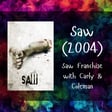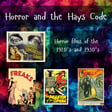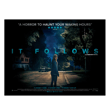Introduction to 'What Haunts You'
00:00:11
Speaker
Welcome to What Haunts You, a podcast about the stories that haunt our dreams. I'm Katie.
00:00:16
Speaker
And I'm Carly. And so
Mental Health in Horror Movies: A Negative Portrayal?
00:00:19
Speaker
Katie, do you want to kind of talk a little bit about why you wanted to have a conversation about mental health and horror? So I've noticed there are like a lot of horror movies with mental health themes, and it seems like most of them are kind of villainizing people with mental illness. And there is like a way that I feel
00:00:44
Speaker
a disconnect from reality with that where I'm like, okay, this isn't like actually that, but at the same time, I'm worried.
00:00:53
Speaker
that people who don't actually know people with mental illness or like, I don't know, I don't even know if I like the term mental illness. Like I, it's just like how I end up talking about it. I think
Language and Stigma in Films
00:01:07
Speaker
like it came up first for me because I like, we recorded hereditary and there are a lot of themes around mental health and, and hereditary, like inherited.
00:01:19
Speaker
things in that and I felt like I was using really stigmatizing language without meaning to. And I think that there's kind of like a societal stereotype of like people who struggle with their mental health being violent when in reality they're much more likely to be victims of violence.
Nuanced Portrayals of Mental Health
00:01:50
Speaker
Yeah, well and I actually feel like that's something that has been getting more born out in more modern movies often too, whereas like it used to be that the only representation of mental illness would be like the villain, whoever the bad guy is, whereas now I feel like very often like we will see main characters who are, whether they're like diagnosed explicitly with anything or not, like very often are dealing with
00:02:16
Speaker
things that we can recognize as mental illness. Yeah, I was watching a few YouTube videos and reading some things that I'm going to put in the show notes that we're talking about that. And one of the things they were saying is that like there has been, there has been like a move towards
00:02:33
Speaker
Having the mental illness or like whatever. I think another one was like dementia where it's not like The bad thing or like they're they're like learning how to cope with it One of the examples they gave was the Baba Duke, which I actually haven't seen but they said that the Baba Duke was like a symbol of her depression and then it's she doesn't destroy it she like learns how to like keep it away and like
00:02:58
Speaker
Yeah, I don't know. So I thought that was interesting. But I think like naturally, like we've talked about how sometimes we're rooting for the serial killer.
00:03:07
Speaker
to kill the people, but it's also like it creates this dichotomy between like this bad evil person. I'm like specifically thinking of Halloween right now, because that's like one where it's like, oh my God, he's like crazy. And that's why he's killing people. And he's in an asylum, but he escapes.
Horror Films and Societal Stigma
00:03:29
Speaker
And with this one video that I watched, it's called Maniacs and Psychos, Mental Illness in Horror Movies.
00:03:36
Speaker
the YouTuber is Renegade Cut, but he said that it's like an ouroboros of misinformation where there's like all of the societal stigma and assumptions and then the movies kind of confirm it and so they just keep feeding themselves and
00:03:55
Speaker
He was also talking about the term psycho and maniac and psycho coming from psychopathy and maniac coming from mania. Psychopaths can definitely be violent, but there are also psychopaths who aren't violent and mania is generally associated with bipolar and
00:04:14
Speaker
people with bipolar are generally not violent. And yeah,
Challenges of Language in Mental Health Discussion
00:04:17
Speaker
and I wrote down a quote from them also that says, we've been conditioned to believe that mental illness is a source of horror and that the mentally ill themselves are a source of horror. When like, actually, I think it's more I like it when it's like more about like, the horror is what the person is coping with, which I think does happen in hereditary to like, it's it is like what they're coping with is scary.
00:04:41
Speaker
Right. And I think the thing with a movie like Hereditary is that kind of everyone in it was mentally ill, like the offenders and victims alike, right? Right. We're all kind of dealing with it.
00:04:53
Speaker
How do you feel about the term mentally ill or mental illness, especially as a therapist? It bothers me, but I don't know what to say. I know there's people who say the mad community, but I'm not sure if that's the word for me either. Yeah, I don't know. I also want to name that I have mental illness. I've been diagnosed with several mental illnesses. Yeah, we are both mentally ill, so I think worth noting.
00:05:19
Speaker
Noting that at the beginning. Yeah. I don't love the term mental illness. I think that it is probably the best term to use for the sake of this conversation because it is immediately recognizable and people will know what we mean.
00:05:36
Speaker
But if you're asking me just one to one, I don't actually know what word I would want. I've never really heard one that I was like, yeah, that sounds right. You know what I mean? I don't know.
00:05:54
Speaker
Right. I've like jokingly called myself crazy. And I know a lot of people like really don't like the word crazy. And I was trying to like take it out of my vocabulary for a while because people seem so upset about it. But I mean, I was kind of like, well, I'm crazy. Like if people are like defining crazy, I'm crazy. And it doesn't actually bother me. But like, I won't use it about a person who doesn't want to be called that. Yeah.
00:06:18
Speaker
I feel similarly actually like in that I am trying to be more deliberate about like when I am and I'm not using that word. But I feel that like in the times where people were labeled crazy, I would have been labeled crazy. And so I just I don't know. Oh, yeah, I for sure would have been institutionalized if I was born like, pretty much any earlier. Yeah. So I don't know. I think that I actually so okay, I there is a part of me that thinks mental illness is a good term because
00:06:47
Speaker
it emphasizes the fact that there is actually something going on. Yeah. And I think that's something that people don't like to poke at too much. People like to, like, it's in your head. And it's like, well, that doesn't mean it's not a problem. Right. Right? And so I think kind of in the same way that people will talk about addiction as an illness, and that's something that helps people really understand that this is not just all pure choice.
00:07:12
Speaker
Right? Like we have free will, but we have these things that like really impact our ability to make decisions. Right. Yeah. I think there have been things that have frustrated me in getting diagnoses because when I was looking for diagnoses for my physical health problems because I was already diagnosed with mental health stuff.
00:07:32
Speaker
a lot of times doctors were like, oh, well, it's actually like just your anxiety or like this is because you have trauma. And like I, when I just went to try to donate platelets, they don't take platelets for anyone who's been diagnosed with PTSD in like the last however many years. And like I got diagnosed with PTSD when I was like 15 and they were, I had other diagnoses that excluded me, but like
00:07:55
Speaker
but I just was kind of like why and that's like one of the ways that it's like really stigmatized in ways that like it doesn't really even make sense to me. That makes sense and I think like it's so hard to talk about something that is so so broad as well. I think like when you think about
00:08:33
Speaker
so many people, so many different things, so many different ways that it could present itself. Totally. So many different experiences with it and perceptions of it. It's almost a moot point. Right. The diagnostics are... The DSM is so much more for insurance than for... And each person is having a separate... But it's just if you can fit into this little category, then you'll be labeled that because it's easier for insurance. Right.
00:08:40
Speaker
the range of mental illnesses
00:09:02
Speaker
I had something really insightful that I wanted to say. Hey, when that happens, I'm sorry. That's okay. I have something else that I think will probably spark more things from you. Okay, go for
Symbolism of Societal Fears in Horror
00:09:12
Speaker
it. Another thing that I've been thinking about is, especially Halloween, I think Michael Myers and figures like that, especially because we see him locked up and that creates some sense of the town is safe when he is locked up.
00:09:26
Speaker
But then when he escapes, they're not. And I think when I look at it from an abolitionist lens, I think a lot of this imagery really makes people, it drives home the point of, there's all these murderers on the street and they want to get you and we have to lock them all away. And that's not really what's happening. And most people who are struggling with mental health,
00:09:52
Speaker
who end up being imprisoned are not violent offenders. They're people who were like sleeping on the street and they're getting criminalized for. Right. And like factually,
Misrepresentation of Mental Illness in Media
00:10:02
Speaker
like people with mental illnesses are more likely to be the victim of a violent crime than to be the perpetrator of one. So like that's just, that is like a fact that we can just kind of have on the table. Yeah. I found, I pulled like three research papers about that because it's like well-documented. Yeah.
00:10:22
Speaker
I think that when we talk about mental illness in a really big way, we are talking about the human experience because when you look at the stats, even the stats make it seem quite common, but we know it's more common than we are dealing with because of our issues with our medical system. You know what I mean? And if it's not hitting you, it's hitting somebody you know. I really feel that it is not separable. Yeah.
Critical Consumption of Horror Media
00:10:47
Speaker
the way that people try to kind of pretend that it is. And so I think that's important. And then I think kind of to what you were saying about with like using Halloween as an example, which is actually like such a good example, right? Of like the kind of problem we're talking about. But I think that that's a, so I think I can understand and I can respect somebody who says like, this movie should not exist. And like, we should not make things like this anymore.
00:11:13
Speaker
I think there's a level of validity to that, but I don't share that opinion. And I think for me, somewhat at least comes down to it is so important that people learn to
00:11:26
Speaker
take in media critically, especially media that is typically more symbolic than literal. And I would say horror definitely falls into that category because the reality of that movie is about a town's dark secrets. That's what it's about. And about the perceived sense of safety that white people have in suburbia. That movie is about... Totally.
00:11:48
Speaker
almost like stuff that's kind of in line ideologically with like the concerns that we're voicing about this part. It's, you know, like I think it's a fair, I think it's like fair to criticize it. But I also think, I guess I just like wish, and this isn't the people who criticize it, like this isn't their fault. But I wish that like everyone else could learn to like watch things with more of a critical lens. Yeah, that's what I was gonna say. Like I wish that people were just more critical
00:12:14
Speaker
not in the judging way, but in the being aware of all of the different nuances.
00:12:20
Speaker
Because I think that's one of the things that concerns me. It's not that I'm viewing it and going, now I feel worse about mentally ill people or something. I'm mentally ill. My family's mentally ill. Most of my friends are. But people who think that they don't interact with mentally ill people, even though I don't think that exists, I worry about them thinking critically about it.
00:12:49
Speaker
And yeah, but and I also think like this isn't just a horror problem, like media in general is bad at mental health. Well, and I think that's why I say like, I wish that like people could learn to watch things critically, not just horror, but like everything. And just like learn to kind of grapple with things a little bit more, like in a deliberate way. That I just think a lot of people are not doing and not and are not like particularly interested in doing from the appearance of it.
00:13:19
Speaker
Yeah, yeah, for some reason this is making me think of 7th Heaven, but there's like a TikToker who's been reviewing 7th Heaven recently. I see it on Instagram, but like...
00:13:31
Speaker
he's been just like showing how ridiculous it is. And I loved Seventh Heaven when I was a kid and watched like all of it. And sometimes I watch it again and it's like a nostalgic comfort thing. But like, I'm very critical of that show. I'm never like, I totally agree with all these values. Right. And yeah, I think it's just important for people to know
00:13:57
Speaker
where the movie was created from. Another movie I've been thinking of is Split, and I don't think I've seen that, but I've heard a lot about of it. And I think there are a lot of movies and shows that use DID, dissociative identity disorder, as a plot device, or it's just
00:14:22
Speaker
I mean, I can see why people are interested in it, but the way that they do it in movies is so overdramatized and not taking care of the real people who live with that condition.
00:14:39
Speaker
I think that one especially because like it's the entire point of the movie, which I think is like, makes it even like that much more, more of a questionable decision. And I'm torn because I
Dialectical Thinking in Appreciating Horror
00:14:50
Speaker
thought that that movie was incredibly interesting. But I also like don't know how I feel about that one really. Right. In terms of like, would I recommend it to someone and like, do I think it's like a good
00:15:06
Speaker
like source of something interesting. You know what I mean? Yeah. What is that term that I can't think of that like is a DBT term about holding two truths at once? Dialectical thinking. It's the entire name of it.
00:15:22
Speaker
Yes, yes. Well, and I think that's part of how I engage with horror, I think, often, especially because I do like older ones that tend to have a lot more problematic elements, as older media often does, especially because the older media that got preserved got preserved because it was made by white people. You know what I mean? It's all pretty.
00:15:42
Speaker
it's all pretty bad. But I think that yeah, I mean, I don't think I think that it is important that like you can, I think it's not important that people like these movies. I don't think that anybody owes that to anybody. But I think it's important that the people who do like these movies also hold that other truth of like, there's some weird stuff here that's like, not great. Right. And like that, that is maybe not in line with like my general values and that I do want to kind of maintain that awareness of
00:16:12
Speaker
that there's some stuff here that I don't love, even if I love the movie. Is there a movie? I can't think of one right now, but is there a movie where you think like, oh, they just went too far and I don't like that movie? Or not even I don't like it, but I'm opposed to this movie. Okay, so this is like, I'm gonna say no. I'm gonna say no, and I'm gonna say no because
00:16:42
Speaker
I don't... Okay, so it's kind of like similar to my...
Engaging with Media Responsibly
00:16:50
Speaker
like stance on like I think people if you're gonna watch horror movies like should if you need trigger warnings like you need to be looking them up and like not relying on other people to tell them to you and I mean obviously someone has to compile that but like people do that so like you need to be like seeking it out or whatever and like I think I think it's and I think this is true of like art in general like I think it's on us to like and there's a line somewhere like certainly
00:17:17
Speaker
But I don't know that I'm the person to identify where that is, and I don't know that I've come across anything that crosses some line that I don't know. You know what I mean? I've watched things that I don't think I would want to watch again.
00:17:33
Speaker
But I don't know that that's the same as me saying I don't think that should be that way. Even some of the worst things I watched, I felt like I understood why they were that way and I was like, it's not about if I like it. Sometimes it makes sense and it's like they're trying to do something and the reality of the situation is even if you don't like how they're doing it, you go do it yourself. I just think art is processing, even dark stuff, even slashers, even whatever. I do
Art as an Emotional Outlet
00:18:03
Speaker
It is processing stuff. And so I just think that when you start to say that X, Y, and Z shouldn't be allowed, it's like you stop letting people process stuff. And I do think there has to be a line. I'm not saying, I am not a free speech absolutist by any means. I was going to say, this is sounding like free speech stuff, which I do. Yeah. I mean, that stuff is complicated too. We don't have time to get into all that.
00:18:32
Speaker
Yeah, yeah, I think like a good example of like, a movie that I know a lot of people feel like shouldn't exist the way it does is like, I think I've told you about it, the movie irreversible, it has like a really extended sexual assault scene. Oh, yeah.
00:18:48
Speaker
And I really was incredibly uncomfortable watching that. And I'm not going to pretend that the level of discomfort that I felt during that scene didn't impact the way the movie left its mark on me by the end. I really do feel that it did. And if I watch that movie again, I'm probably not going to watch that scene all the way through. And I think that's also fine. And I think you can watch it and skip it altogether. I think that's fine.
00:19:15
Speaker
like who am I to be like I was super uncomfortable so like this can't happen you know what I mean like I just don't like really I don't know and like I do think there is a line I just like don't think that I have like seen it often yeah for myself at least and I think that you know we all have things like because there are things that I don't like that like like are about me you know what I'm like and I'm just like
00:19:42
Speaker
You know what I mean? I think that's one of the things that I really appreciate about horror because it makes me check in with myself before watching things usually, which I don't do with other genres. Usually I watch them pretty casually, but I'll be like, okay, this is what this is about. Is that what I want to engage with right now?
00:20:05
Speaker
And that's something I'm trying to practice in my general life. Yeah, I think that's a really, I think that's a really good point. And I think that that's like one of the things to me about horror is like, it is like something that you need to engage with selectively. And like, I happen to be able to engage with like quite a variety of things and like a vast array of things because I think that like I do there, I do feel that I get something out of those experiences. But I, I think that like,
00:20:33
Speaker
it's like up to people to know themselves. And I think that like,
00:20:37
Speaker
I don't know. I think there's so much, and I think this is, again, the both and of it. I can think something is really fucked up and never want to see it or engage with it. And I can say there's probably someone who's going to get something out of that. And I don't mean in a voyeuristic way. I mean the way I was talking about with that one movie, where I do feel like the whole movie really... I think it would have landed either way, but it really... I was completely shaken to my core by it. And in a way that felt valuable to me.
00:21:07
Speaker
Yeah, and like made me think about it for the rest of the night not about that scene but about the point of the movie which I thought was a good point and so like I Don't you know what I mean? Yeah, I don't know like I think something nice about like engaging in media with like people you trust Mm
Personal Reactions to Horror Content
00:21:25
Speaker
-hmm, and you know me like I love to be like I'm gonna find a horror movie like to people who don't like horror movies You know, maybe like that's like my hobby but I also feel like I
00:21:37
Speaker
you know like I have friends who like any sexual assault stuff is like a hard no for them in a movie like even if it's just like a tiny flash like it's like it doesn't matter they're like hard no we're not doing it and so I don't recommend those to those you know what I mean and like I don't recommend them to people I don't think that like people need to like learn to like those things but I just think there's also room to be like I don't know like personally when I watched like
00:21:59
Speaker
I don't know, like a rape revenge movie. I like it. I'm like, I'm like feeling my feminine rage. I'm like, I don't know. Like, and that doesn't have to be for everyone. That's so fine. But I'm like, yeah, cut his dick off in the tub. Like, I don't know. I think I probably would like that with revenge, right? It depends on the scene. But I know, like, I know so many people love Clockwork Orange and say it's like one of the best movies. And as soon as the assault scene started, I was like, I have to leave. I can't watch this. I yeah.
00:22:29
Speaker
I actually really dis... That's one that I wouldn't watch again. The first time I tried to watch it, I turned it off. And the second time I watched it all the way through, but I was like, I never want to watch that again. I didn't like it. It didn't land for me. But I'm like, you know what? People like it. Fuck it. I don't know. It's fine. And I think especially with assault,
00:22:48
Speaker
I just feel like there's so many movies where a man wrote it, it's a male director, it's all men making the scene happen, and it's gratuitous, unnecessary sexual violence towards women. And it just doesn't even make sense. It's
Violence in Films: Reflection of Real Life?
00:23:06
Speaker
not a plot device. It sounds like it is an irreversible.
00:23:09
Speaker
Yeah, it's like the entire plot. And that makes sense to me. But it's sometimes there's there are a lot of movies where it's just happening. Yeah. Because it's happening. And I'm like,
00:23:21
Speaker
I think that's fair. I think that's totally valid. And, and this is like, again, me always kind of I'm always kind of doing this in my head of like, how are the two what are like the multiple ways that I can look at this. And I like agree with everything you're saying. And the other part of my brain is like, that's real life. There's like gratuitous unnecessary violence against women sexually all the fucking like, so I'm just like, I
00:23:42
Speaker
That's true. I wish that more women were making these movies so we could have it with more of a female gaze. That would be awesome. But generally, yeah, I don't know. Yeah. I mean, you're not wrong. The other thing I was going to say is I think part of why I was feeling bad about myself for using stigmatizing language in hereditary
00:24:05
Speaker
And I haven't listened to it back, so maybe I'll have to see what I actually said and if it bothered me and maybe I'll comment on it then. But I think it's kind of like I was talking about with the shame nerve, all of the language is stigmatizing. The words were created to be stigmatizing and it's hard to talk about these things without being super intentional in a way that's not perpetuating that.
00:24:32
Speaker
Yeah. Well, and I think that that is why when you brought this up, I was like, this feels like something we can like touch base with regularly because I want to talk to you like I would talk to you. Yeah.
Balancing Conversation and Critical Reflection
00:24:49
Speaker
And I want to hold space for the fact that we are like having these conversations that are like loaded in these ways and like carry all this baggage, not just around mental illness, but like around a lot of stuff. Totally.
00:25:00
Speaker
And I don't want to spend all of our time doing this. You know what I mean? I would like to sit down and do this deliberately. And I want to be able to sit down and talk about a movie with you. Yeah, I don't want to be
00:25:15
Speaker
I wanna be able to be self-reflective and critical of myself, but I also don't wanna be doing that in a way where I can't just talk, just have a normal conversation. But I think it is really good to reflect back on what you've said just outright and be like, okay, maybe that was a little something, I don't know.
00:25:37
Speaker
Yeah, no, I agree.
Reflecting on Language Use
00:25:38
Speaker
And I think that'll be good. And I think that this is also good practice for being really intentional about language, which I think everyone should be all the time anyway. Yeah. And I think it's one of those things where for me as somebody who has struggled with mental illness for ever, I'm probably going to use the word crazy. Same.
00:25:59
Speaker
And I used it in Rosemary's Baby about Rosemary, like I like explicitly remember that and like I'm probably going to do that. And like, I'm open to like conversation about that and like I'm not saying my mind could never be changed but like as of right now for like who I am.
00:26:13
Speaker
I like feel kind of okay about that. And like, I don't like, but I also feel okay about like, a lot of what that episode was about was about the way she was being gaslit. You know what I mean? And like, that wasn't like, you know what I mean? And so it's just like, I'm not gonna be, I don't know, like, do you know what I mean? Like I want to like, I want to be able to just like talk. Yeah, I was struggling with the language too, but for them, speaking of language, but yeah, like I want us to just be like natural and sweet. And I don't want to like have to do
00:26:42
Speaker
I don't want to feel scripted. Okay this is like of course my example because like I'm just gonna like this is just who I am as a person but you know I listen to that Stephen King podcast all the time and like
00:26:55
Speaker
And like they'll talk like when they're going through the books like he is like notoriously He's gotten better like over the course of his career But he's like notoriously problematic with some of the way he writes disabled people black people sometimes women but I I tend to like a lot of his women so I I don't know how I feel about that one, but people say that and I think there's something to it and
00:27:16
Speaker
And a lot of the time, they'll confront it the first time it comes up in conversation and then be like, we know this is going to go on throughout the whole book. We're not going to take up half of this discussion to mention that every single time it's relevant. Then we might as well make a conversation about the problematic ways that Stephen King
00:27:40
Speaker
writes his characters, which I think that could be a podcast, you know what I mean? But that's
Purpose and Management of Podcast Content
00:27:45
Speaker
not what that podcast is. And so we could make a podcast about this, or we can do what we're doing right now and have these episodes about this. But that's not what those episodes are.
00:27:56
Speaker
those themes are there because they're the themes of the movies often, right? Those are the ones that we tend to gravitate towards, but that's not like explicitly what it is about either. Yeah, I think that it's good for us to check in on this, but I don't want that to be what our whole episodes are about either. I think that there are sometimes things that are like really egregiously offensive that makes sense to mention. Yeah. But
00:28:22
Speaker
Yeah, it's in general, I think that it's just good for us to check in. And I don't think mental health is even like the only topic. I think it's good for us to just check in about how we're talking about a lot of things like race and gender and all these things that were like characters tend to be more stereotyped than like real people are.
00:28:42
Speaker
Yeah, absolutely. Yeah, and I think this was a good idea to just kind of like name some of these things. And especially because I do feel like I mean, when you mentioned I want to like have this conversation maybe before we do some of these movies we have coming up that have similar themes, I like looked at our list and was like, Oh, what could we do instead? And I was like, none of this.
00:29:08
Speaker
It's literally all that. Yeah. Thank
Encouragement for Listener Feedback
00:29:10
Speaker
you everybody for listening. I know this was like a different kind of conversation than we ever kind of like advertised having on here, but I think it's an important one. If you want to give us any feedback about any of this or share your thoughts, you can find us at what haunts you pod on Instagram and we will see you next time.













